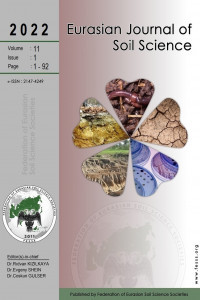Wheat growth and nitrogen use efficiency under drip irrigation on semi-arid region
Wheat, drip irrigation, nitrogen fertilization, urea formaldehyde Nitrogen use efficiency, water productivity,
___
- Alam, M., Trooien, T., Stone, S., Rogers, D., 2018. Subsurface drip irrigation for Alfalfa. K-State Research and Extension, Irrigation Management Series. Kansas State University Agricultural Experiment Station and Cooperative Extension Service, USA. Available at [Access date: 01.10.2018]: https://itc.tamu.edu/files/2018/05/MF2867.pdf
- Amal, G.A., Zaki, N.M., Hassanein, M.S., 2007. Response of grain sorghum to different nitrogen sources. Research Journal of Agriculture and Biological Sciences 3(6): 1002-1008.
- Chikowo, R., Mapfumo, P., Nyamugafata, P., Giller, K.E., 2004. Mineral N dynamics, leaching and nitrous oxide losses under maize following two-year improved fallows on a sandy loam soil in Zimbabwe. Plant and Soil 259(1-2): 315-330.
- Dewis. J., Freitas, F., 1970. Physical and chemical methods of soil and water analysis. FAO Soils Bulletin No.10, Rome, Italy. 275p.
- El-Boraie, F.M., 2004. Modeling of water requirement for Egyptian and Sudanese pearl millet. PhD Thesis. Institute of African Research and Studies, Natural Resources, Cairo University, Egypt.
- El-Rahman, G.A., 2009. Water use efficiency of wheat under drip ırrigation systems at Al-Maghara Area, North Sinai, Egypt. American-Eurasian Journal of Agriculture and Environmental Science 5(5): 664-670
- Guo, S., Zhou, Y., Shen, Q., Zhang, F., 2007. Effect of ammonium and nitrate nutrition on some physiological processes in higher plants ‐ growth, photosynthesis, photorespiration, and water relations. Plant Biology 9(1): 21-29.
- Hamdallah, G.M., Devi Prasad, J., Al-Hendi, A.A., 1988. Crop response to sulfur-coated urea (SCU) and other N-carriers in sandy soils of Saudi Arabia. Fertilizer Research 15(1): 47-54.
- Hanafi, M.M., Eltaib, S.M., Ahmed, M.B., Omer, S.R.S., 2002. Evaluation of controlled-release compound fertilizers in soil. Communications in Soil Science and Plant Analysis 33(7-8): 1139-1156.
- Huggins, D.R., Pan, W.L., 1993. Nitrogen efficiency component analysis: An evaluation of cropping system differences in productivity. Agronomy Journal 85(4): 898-905.
- Hussain, G., Al-Jaloud, A.A., 1995. Effect of irrigation and nitrogen on water use efficiency of wheat in Saudi Arabia. Agricultural Water Management 27(2): 143–153.
- Klute, A.A., 1986. Methods of soil analysis. Part 1 & 2. American Society of Agronomy & Soil Science Society of America, Madison, Wisconsin USA.
- Koivunen, M.E., Horwath, W.R., 2005. Methylene urea as a slow-release nitrogen source for processing tomatoes. Nutrient Cycling in Agroecosystems 71(2): 177-190.
- Lawlor, D.W., 1995. The effects of water deficit on photosynthesis. In: Environment and Plant Metabolism. Smirnoff, N. (Ed.). Bios Scientific Publishers, Oxford, pp. 129–160.
- Paramasivam, S., Alva, A.K., 1997. Nitrogen recovery from controlled-release fertilizers under intermittent leaching and dry cycles. Soil Science 162(6): 447-453.
- Rajaram, S., Braun, H.J., van Ginkel, M., 1996. CIMMYT's approach to breed for drought tolerance. Euphytica 92(1-2): 147-153.
- Viswanatha, G.B. , Ramachandrappa, B.K., Nanjappa, H.V., 2002. Soil–plant water status and yield of sweet corn (Zea mays L. cv. Saccharata) as influenced by drip irrigation and planting methods. Agricultural Water Management 55(2): 85-91.
- Waddell, J.T., Gupta, S.C., Moncrief, J.F., Rosen, C.J., Steele, D.D., 2000. Irrigation and nitrogen-management impacts on nitrate leaching under potato. Journal of Environmental Quality 29(1): 251-261.
- Wen, G.T., Mori, T., Yamamoto, J., Chikushi, J., Inoue, M., 2001. Nitrogen recovery of coated fertilizers and influence on peanut seed quality for peanut plants grown in sandy soil. Communications in Soil Science and Plant Analysis 32(19-20): 3121-3140.
- Zeidan, M.S., El Kramany, M.F., 2005. Effect of organic manure and slow – release N fertilizers on the productivity of wheat (Triticum Aestivum L.) in sandy soil. Acta Agronomica Hungarica 49(4): 379-385.
- Zvomuya, F., Rosen, C.J., Russelle, M.P., Gupta, S.C., 2003. Nitrate leaching and nitrogen recovery following application of polyolefin-coated urea to potato. Journal of Environmental Quality 32(2): 480-489.
- Yayın Aralığı: Yılda 4 Sayı
- Başlangıç: 2012
- Yayıncı: Avrasya Toprak Bilimleri Dernekleri Federasyonu
Mohamed Said AWAAD, Tarek H.m.a. DESHESH
Coşkun GÜLSER, Zhenis ZHARLYGASOV, Rıdvan KIZILKAYA, Niyazbek KALİMOV, İzzet AKÇA, Zhaksylyk ZHARLYGASOV
Lisa HASELOW, Holger RUPP, Andrej A. BONDAROVİCH, Ralph MEİSSNER
Rania AYDİ BEN ABDALLAH, Hayfa JABNOUN-KHİAREDDİNE, Ahlem NEFZİ, Fakher AYED, Mejda DAAMİ-REMADİ
Dinesh KHADKA, Sushil LAMİCHHANE, Rita AMGAİN, Sushila JOSHİ, Shree P. VİSTA, Kamal SAH, Netra H. GHİMİRE
Abba NABAYİ, Abubakar Halilu GİREİ, Mohammed Saleh ABUBAKAR
Aneela RİAZ, Munazza RAFİQUE, Muhammad AFTAB, M. Amjad QURESHİ, Hina JAVED, Fakhar MUJEEB, Saleem AKHTAR
Md. Abdul MOJİD, A.b.m. Zahid HOSSAİN, Guido C.l. WYSEURE, Md. Ali ASHRAF
Zhainagul YERTAYEVA, Rıdvan KIZILKAYA, Sagynbay KALDYBAYEV, Nurzikhan SEİTKALİ, Nurgul ABDRAİMOVA, Aigul ZHAMANGARAYEVA
